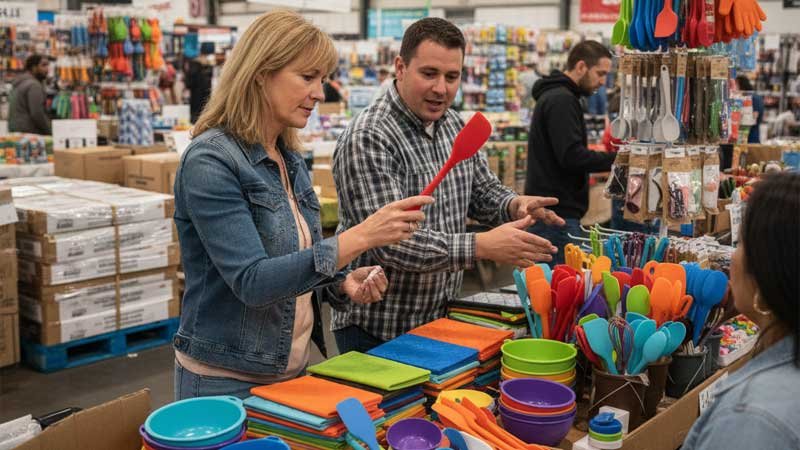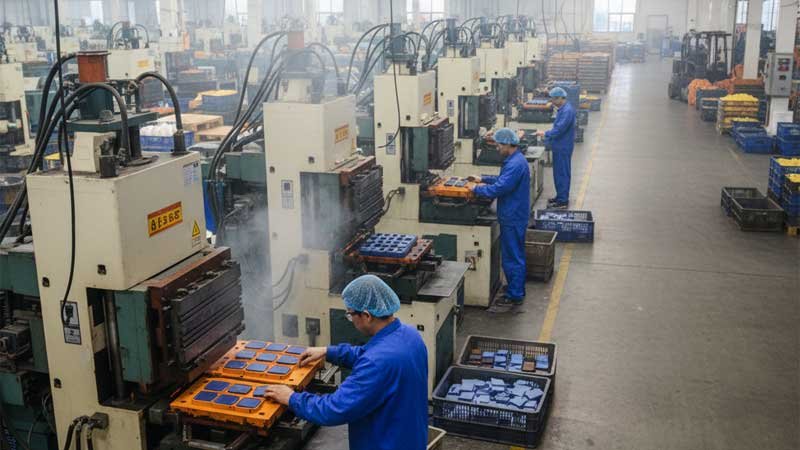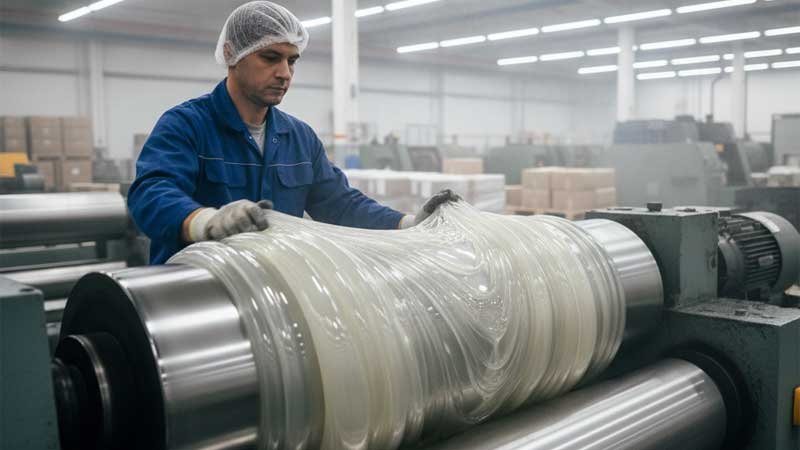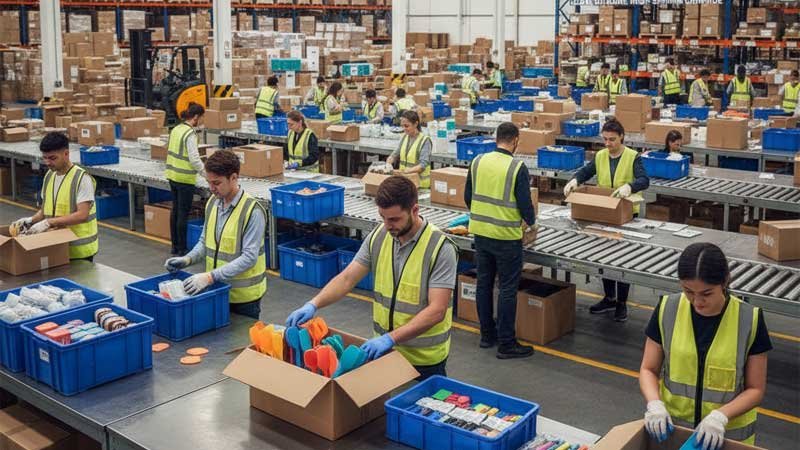When developing a silicone product, finding dependable partners is just as important as design or innovation. Manufacturers and suppliers both serve critical functions, yet their roles are not the same. This post will explain the key differences between the two and guide you in selecting the right option for your needs.

What Is a Silicone Manufacturer?
A silicone manufacturer sits at the core of the supply chain. They manage the source of raw silicone materials and can formulate compounds to meet specific performance requirements.
Manufacturers usually own production equipment and processes, including compression molding, injection molding, and Liquid Injection Molding (LIM). This allows them to provide highly customized products, such as food-grade silicone baking molds, industrial seals, or high-performance electronic insulators.
The advantage of working with a manufacturer lies in their deep understanding of materials and processes. They can control product quality and provide technical support along with necessary certifications, such as FDA, LFGB, or ISO.
For example, if you want to develop a silicone ice tray, contacting a manufacturer gives you access to formulation optimization, mold design, and small-batch testing—services that a supplier typically cannot offer.
What Is a Silicone Supplier?
A silicone supplier usually does not produce products directly. Instead, they source finished or semi-finished silicone items from various manufacturers and manage inventory, sales, and distribution.
Suppliers excel in offering a wide range of products, catering to small-batch or diverse purchasing needs. They can respond quickly to orders and deliver in a short time, but customization is limited, as most items rely on standard products and certifications from manufacturers.
For instance, a supplier may offer various silicone wristbands, baby pacifiers, or silicone spatulas. Customers can select from stock without engaging in complex product development. For startups or businesses with low customization needs, suppliers reduce procurement complexity and save time, making them an efficient option.

What Are the Key Differences Between Manufacturers and Suppliers?
In the silicone industry, manufacturers and suppliers play clearly distinct roles. These differences go beyond whether they are directly involved in production. They also affect customization capabilities, cost structure, lead time management, and technical support.
Understanding these distinctions helps businesses make better purchasing decisions, reduce costs, and ensure product quality. The table below summarizes the main differences:
| Feature | Manufacturer | Supplier |
| Production capability | Yes, with full process control | No, relies on manufacturers for production |
| Raw material control | High, can optimize formulations | Low, mainly resells ready-made products |
| Customization ability | High, can develop personalized products | Medium to low, mainly offers stock items |
| Price transparency | High, clear cost breakdown | Medium, includes distribution and inventory costs |
| Lead time control | Strong, can ensure stable large-volume supply | Flexible, limited by stock availability |
| Technical support | Complete, including testing and certifications | Depends on manufacturer-provided information |

When Should You Choose a Manufacturer or a Supplier?
Deciding between a manufacturer and a supplier depends on your company’s specific needs, order volume, product complexity, and supply chain strategy. Choosing the wrong option may lead to higher costs or delayed delivery.
When to Choose a Manufacturer
- Highly customized requirements: For example, developing high-temperature-resistant, oil-proof, antibacterial, or non-stick silicone kitchenware requires formulation optimization and mold design support.
- Large-scale orders: Long-term supply contracts, strategic inventory, or brand series production need consistent quality and batch uniformity.
- Technical and certification needs: Products for food, medical, or high-performance industrial applications require complete testing reports and certification support.
For instance, a new baking brand planning an innovative food-grade silicone baking mold will benefit from a manufacturer who can customize hardness, elasticity, and heat resistance, provide mold development, trial production, and certification reports. In such cases, contacting a manufacturer directly is the best choice.
When to Choose a Supplier
- Small-batch or diverse orders: Startups or e-commerce platforms buying multiple ready-made silicone wristbands, spatulas, or baby products, where flexibility and standard specifications are sufficient.
- Flexible delivery: Suppliers offer stock availability and fast shipping, ideal for market testing or short-term promotions.
- Low customization needs: Standard products meet functional requirements without extra technical support.
For example, a retailer sourcing standard silicone wristbands for online sales can quickly obtain different colors and models from a supplier. This saves the time and effort of finding a manufacturer, developing molds, and waiting for production, improving operational efficiency.

How to Find Global Silicone Manufacturers?
When looking for manufacturers, the focus should be on companies with production capability, formula development, and certification. Reliable ways to find them include:
- International trade shows: Events like K Show (Germany), Chinaplas (China), and NPE (USA) give you the chance to evaluate factories face-to-face.
- B2B platforms: Websites such as Alibaba, Global Sources, and ThomasNet make it easier to filter and connect with global factories.
- Industry associations: Groups like the China Rubber Industry Association and the European Rubber Association often publish trusted company directories.
- Third-party audits: Organizations such as SGS, TÜV, and Intertek can verify factory qualifications and certifications, including FDA, LFGB, and ISO.
How to Find Global Silicone Suppliers?
Suppliers are better suited for small orders, quick delivery, and diverse product needs. Common channels include:
- E-commerce and wholesale platforms: Options like Alibaba, Amazon Business, and DHgate allow for fast and flexible sourcing.
- Regional wholesale markets: Locations in Los Angeles, Germany, and Dubai serve as hubs for bulk silicone products.
- International directories: Resources such as Europages, Kompass, and national Yellow Pages can connect you with local agents.
- Overseas warehouses: Some manufacturers in China and India keep stock in the US, Europe, or the Middle East, enabling localized delivery.

Partner With RuiYang for Lasting Success
Since our early days, RuiYang has been committed to high-quality silicone manufacturing. With extensive industry knowledge and proven processes, we guide our clients through every step of production. Our team offers more than manufacturing — we deliver expertise, innovation, and peace of mind. If you’re ready to turn your product idea into reality, RuiYang is here to support you at every stage.